|
A short bio on Mr. Pound: he’s a current Canadian member of the International Olympic Committee, its former Vice-President and has a history of saying some really ignorant things. Lo and behold, he’s struck again. This time, Pound targeted Western media for what he deems the unfair targeting of the Sochi Games in relation to Russia’s anti-gay laws. His message - Russia’s really not that bad, they’re not killing anybody, everybody chill out. So it’s a target of convenience with respect to Russia…not that I approve of the law, but putting it on a scale of 1-10 of odious laws, it’s not way up there near 10. What would be a 10? If Russia had laws on the books that explicitly sanctioned the killing of gays? And since the law is not a 10, we should say nothing? Glad that’s settled. On with the Games! It’s a target of convenience, Mr. Pound, in so much as the IOC elected Russia as host country for these Olympics. This is not a random attack on Russia. There are gross injustices being meted out to Russians and the whole world will be watching, thanks to your beloved Olympic Games. But, there’s too much money at stake for them to back out now. It’s in the Committee’s best interest to deploy bait and switch tactics to downplay the atrocities perpetrated by the Russian government. Pound also worked in a jab at the United States, saying that much of the criticism of Russia’s nationwide ban on “propaganda of nontraditional sexual relations” in areas visible to minors is coming from U.S. states that don’t allow same-sex couples to marry. So, the U.S. should keep quiet because it’s being a massive hypocrite? There’s no gay marriage in the some states, so what moral high ground does the U.S. have to stand on in criticizing Russia? This shows Pound has no understanding whatsoever about “gay stuff.” While marriage has become the face of the so-called gay movement, it isn’t the only thing gays are concerned about. There’s also the disproportionate rates of gay teen suicide, hate crimes, tax benefits, end of life decisions etc. A little intellectual curiosity goes a long way! In 2007, Pound found himself in similar hot water. Of Floyd Landis’ positive test at the Tour de France, he quipped: “I mean, it was 11 to 1!” Pound said, referring to Landis’s reported testosterone-to-epitestosterone ratio, a measure used to identify doping. “You’d think he’d be violating every virgin within 100 miles. How does he even get on his bicycle?” Violating? As in raping? Is that what he really meant to say? How does rape rank on the 1-10 scale? This “stuff” is straight from the misogynist playbook. I imagine he thought he was just being funny, but it’s his straight, white male privilege that compels him to continually miss the mark by such a wide margin.
Truth is, he’s also smug and arrogant. Dick Pound visited Ithaca College in 2006. I was a junior at the time and attended a public lecture entitled, “The Olympic Games in a Time of World Conflict.” I asked him a question regarding the utility of the World Anti-Doping Agency (of which he was Chairman) - given that testing seemed to always be playing catch up to new designer drugs, I suggested that drug testing only widened the gap between the haves and have nots. My logic was that those who could afford to cheat the system would always hold the advantage. He told me my question made no sense and it was ludicrous to suggest there could be anything negative about drug testing. The thing about Dick Pound and those who defend the Olympic Charter is that they throw around words like “fair play” and “Olympic Spirit” so as to elevate themselves above the fray. How can anybody question their integrity when they’re the arbiters of sport? This has been the modus operandi of Pound and the IOC for decades. If they say the Games are to be without politics, then they are. The end. It must be very inconvenient for them that, in this internet age and social media, it’s oh so difficult to sweep all this socio-political “stuff” under the rug. An athlete’s body is political. His/her decision to represent a country on a global stage is a political act. The world in which these Games take place is filled with political strife. Thus, it’s impossible for sport and politics not to intersect. To try and whitewash politics from sport tells me that Pound and the IOC have very little regard for our intellect. It’s up to athletes and activists to continue to agitate, and make sure Russia and the IOC answer for this “anti-gay stuff.” For a more on Russia’s anti-gay law and the Sochi Games, click here.
1 Comment
The 2014 Australian Open continued its knack for the unexpected when pre-match underdog, Stan Wawrinka, beat a hobbled Rafael Nadal to win his first Grand Slam title 6-3 6-2 3-6 6-3. The Stanimal lived up to his nickname after toppling both Nadal and Djokovic at the same tournament - a herculean feat. Stan burst through the gates to overwhelm Nadal with a blistering first set. Ripping winners at will, Wawrinka displayed no signs of a nervy first time finalist. Instead, he took the entirety of his game to Nadal. It was an awesome display of "big babe tennis" - nothing Rafa mustered seemed to affect Stan in the slightest. Then, up a set and a break in the second, we saw the first sign of injury from Nadal. If the sight of Nadal getting blitzed on Rod Laver Arena weren’t jarring enough, then what followed would unsettle even the sturdiest of constitutions. Nadal immediately left the court to take a medical time-out, at which point Wawrinka lambasted the chair umpire for not disclosing to him the nature of Rafa’s injury. The back and forth went on for minutes with Stan getting increasingly heated. Upon returning to the court, a shirtless Nadal was greeted by a chorus of boos. Wawrinka has since said that he was surprised by the crowd’s reaction and that he was in no way attacking Nadal’s integrity: He’s always a really fair player. He always tries his best. He is always fighting. The problem for me, it was not that he was taking a physio, that he left the court. I just wanted to know why, what was this problem, just to know for the rest of the match. But, yeah, was quite strange that the crowd start to boo him. You can watch the whole incident here.
Perhaps the crowd was still hungover from Azarenka’s display last year against Sloane Stephens, but it’s doubtful that things would have escalated to the point they did without the crowd feeding off of Wawrinka’s anger toward the umpire. Even if Stan didn’t intend to call Rafa’s injury into question, the crowd inferred something from the exchange, something damning and untoward. More than anything, this incident brought forth the seedy underbelly of tennis partisans; they spew all manner of vitriol against players they don’t like. The reactions, particularly on Twitter, showed that a large number of people think Nadal is a cheat and this was yet another example. I won’t waste space giving specific examples - if so inclined, a simple Google search will fill in those gaps. Nadal continued, clearly inhibited by his back. When Wawrinka won the second set, all eyes watched to see if Nadal would retire. He didn’t. He found a few more clicks on his serve and, aided by some tentative play from Wawrinka, stole the third set. This final became a contest between Stan’s mental struggles and Nadal’s physical pains. Make no mistake, Stan Wawrinka won this match. He didn’t get lucky. He had Nadal on the ropes, much like he did with Djokovic and every other opponent over two weeks in Melbourne. There is no asterisk beside his name; he deserved the trophy. Outside of Juan Martin del Potro, Wawrinka is the first player outside the “Big 4” to win a Slam since Marat Safin in Australia 9 years ago. All the extraneous and bizarre facets of the match should not undermine the enormity of the achievement. Despite the loss, Nadal extends his lead over Djokovic in the ATP rankings, now in excess of 3500 points. Along with becoming the only man in the Open Era to win the career Grand Slam twice, a Rafa win could have also made him the first to cross the 15,000 point threshold. He entered the final three sets from a 14th Slam, and left with questions about his body and a new challenger for 2014. Wawrinka catapults to world #3 and, with that achievement, finally steps out of the long shadow cast by Roger Federer. Nadal and Djokovic have been warned; they’ve got company at the top. With the Stanimal’s coronation in Melbourne, the ATP now boasts an embarrassment of riches. One could make the case for each of the top 8 ranked players winning a major in 2014 (except Ferrer?). The Stanimal has altered the tennis landscape once more, and entered the uppermost echelon of men’s tennis, a height even he doubted he’d ever reach. The onus is now on him to make it count for the rest of the year. Those who have played sports know what it feels like to be in constant search of perfection. It’s often the driving force that brings us back for more punishment - heartbreaking losses, hours of practice, the willingness to play through injuries, stretching the body’s limits. Sport is both mental and physical. Li Na found perfection in the Australian Open final. She conquered the mental demons of two failed attempts at Aussie glory, and orchestrated a symphonic, yet lethal, second set to defeat Dominika Cibulkova. After a competitive first set that Li snatched in a tiebreaker, the Chinese trailblazer sprinted to a 6-0 finish in the second. Something special happened in that second set. It featured some of the most sure-footed, sweet-swinging tennis you’ll ever see. Li’s impeccable footwork placed her in perfect positions to swing through the ball, create impossible angles, and astound with the stealthy precision of her backhand. That backhand. The sweet sound of that backhand.The power of that backhand. Li Na’s backhand is an example of where beauty and art intersect with sport, a breathtaking thing to witness. Dominika Cibulkova has nothing to be embarrassed about. She showed little nerves in her first Slam final, in a match that very few expected her to win. Not only did she compete well, but she charmed the crowd on Rod Laver Arena and endeared herself to the tennis world. Her future is now brighter than it’s ever been. She’s often referred to as a “scrappy” player, but that doesn’t quite do her talent justice. She beat the numbers 3, 5 and 11 seeds on her way to the final. Simply put, she’s got game. But this match was Li’s showcase. Despite the immense pressure of playing all seven matches as the favourite, she sustained her poise and trademark humour. When she watched Cibulkova’s final forehand sail just long, Li raised her arms in muted celebration, the kind that signalled relief more than anything else. Twice before she had let a 1 set lead evaporate in the Australian Open final. This time, perhaps spurred by having already saved a match point against Safarova in the 3rd round, Li made no mistake. It’s not just that Li Na was too good a player to have only won one Slam, it’s that her game was too good as well. Sometimes players succeed at a rate that doesn’t match their physical gifts. Maria Sharapova is a good example. Her ability to grind and compete has won her so many matches that less determined players of similar talent would have lost. Li Na is different. When you watch her play, there’s no questioning her ability - she’s got the strokes, she’s got the game. On Monday, Li Na will officially become the third ranked player in women’s tennis - a position she’s occupied unofficially for most of the last year. Serena, Vika, Li - sounds about right. These are the three players who have been the most consistent over the past 12 months and now the rankings will reflect it. I’ve gone into some detail trying to capture what makes Li Na such a great tennis player. But, there’s more to her than that. What makes her such a force is her irresistible personality. It’s what helped vault her into international superstardom after winning the 2011 French Open. Her acceptance speeches are now part of the main event; she’s easily the funniest woman on the WTA Tour. It was no small feat that, after having just won one of the most important matches of her career, Li then gave one of the greatest speeches you’ll ever see. The 2014 Australian Open will be remembered for many things, one being the slew of upsets on both sides of the draw. Few people expected somebody other than Serena Williams to be the last woman standing. I certainly didn’t. Instead, we got another of the WTA’s biggest names. This final should remind us that Li Na is one of a kind - an immense asset to tennis, a magnetic star, the complete package. Watch Li Na’s victory speech below. With tennis greats Sampras, Rosewall. Laver and Edberg in attendance, Rafael Nadal called upon his very best to overcome another legend, Roger Federer, 7-6 6-3 6-3.
Despite not beating Nadal in a major since 2007, this encounter offered more promise for Federer given his sterling play in the preceding rounds. Other considerations threatened to tip the balance more in his favour as well: Rafa’s blister, whether the roof would stay open on Rod Laver Arena, and if Nadal could regain the speed on his serve that vanished against Dimitrov. Under normal circumstances, Nadal would be considered the heavy favourite, yet all these considerations had many (myself included) thinking that Federer stood a very good chance of reversing the trend between the two. Yet, we witnessed a straight sets win that spoke more to Nadal’s ability to zone in at such a high level, for such a prolonged time. Federer didn’t play poorly by any metric, it’s just now more apparent than ever that Rafa is able to draw on reserves that even Roger can’t. Historically, the most important part of the Nadal-Federer rivalry has been Rafa’s ability to unsettle Roger and get inside his head. Pundits may talk about strategy and Rafa exploiting Federer’s backhand endlessly, but this match showed once more that it’s the intangibles between the two that separate them most. When Roger complained to the chair about Rafa’s grunting on the 2-1 changeover in the 2nd set, we saw actual evidence of Rafa’s mental stranglehold. I won’t delve into match statistics - for a detailed account of how it all unfolded, visit Beyond The Baseline’s live analysis here This match held added significance as both men figured to be the presumptive favourite against Wawrinka in the final. As for the G.O.A.T debate, Federer supporters are wont to point to the overall tally of Slam wins as indicative of his superiority. Accordingly, this match carried real weight with the likelihood of each being able to notch another feather in the cap. However, how can we, in good conscience, ignore the actual play between the two on court? Not only does Nadal beat Federer while elevating his own game, but he also forces Roger into a lower level of play. The Federer that we see when they play is not the same Federer that takes the court against everybody else. This is pretty damning to Roger’s candidacy. Moreover - as we saw in the third set - Nadal broke Federer’s spirit. It’s a jarring picture to see someone of Federer’s stature seemingly overcome by an opponent. Though Federer fans will be disappointed by tonight’s result, all is certainly not lost. Federer’s tennis at this Australian Open is a far cry from what we’ve seen over the past 12 months. That he lost to Nadal is not something that should dampen his prospects for 2014. Instead, his superb play against Tsonga and Murray is what he should hang his hat on. There are many positive from which Federer should draw to propel him on to better results. Looking forward to the final: Nadal looks to become the first player in the Open Era to win a career Grand Slam twice. He’s undefeated against Wawrinka (12-0), but most of those matches weren’t played against the Stanimal we’ve seen emerge over the last 12 months. It would be foolhardy to brush Wawrinka aside as not standing a chance in the final; he unseated Djokovic and backed that win up with a solid semifinal win against Berdych. Rafa will enter the overwhelming favourite - especially after his display tonight. However, we should still have more scintillating tennis in store, a fitting end to a tournament that’s already provided so many thrills. 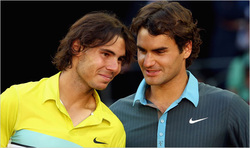 Photo credit: Clive Brunskill/Getty Images Photo credit: Clive Brunskill/Getty Images Here we are, on the cusp of the 33rd instalment of a rivalry that has given the tennis world some of its greatest thrills. It comes at an unexpected time, mostly because of Roger Federer’s uncertain play over the last year. Consider too the arduous draw he encountered at the start of the tournament, and it’s a pleasant surprise that he’s arrived at this point in such good shape. Rafael Nadal faced a similarly daunting task when the draws were revealed. He certainly benefited from Juan Martin del Potro’s shock loss in the second round. Even so, he’s found the going very tough, battling through a myriad of factors to even make it this far. The prospect of another meaningful Federer-Nadal showdown at a Grand Slam has riled each player’s rabid fanbase. A Nadal-Djokovic final seemed so inevitable; they’ve sustained such high levels over the past year that everyone else appeared to be mere footnotes on their path to another Slam final. Yet, we’ve been treated to this delicious change of narrative. The unexpected happened at this Australian Open. The Argentine dark-horse fell meekly by the wayside. Stanislas Wawrinka exorcised the demons of 2013 and overcame his Serbian nemesis. Roger Federer recaptured the form and wizardry of yesteryear, powering through the draw with remarkable ease. Meanwhile, Nadal found himself having to fight tooth and nail against inspired opponents, and the untimely emergence of a much talked about blister in the middle of his left hand.
Federer has played awesome tennis for the majority of this tournament. It has prompted many to wonder if he’s well and truly back. The excitement is not without merit. He’s turned back perennial bugaboos Jo-Wilfried Tsonga and Andy Murray with remarkable aplomb. It’s a fantastic result, but the real test will be if he is able to conquer Nadal too. Roger may be in good physical shape, but Rafa will provide a stern examination of where he’s at mentally. No player in Federer’s storied career has been able to get inside his head the way Nadal has. Still, there are a number of mitigating factors that could impede the scintillating tennis we’re all hoping for. Nadal has been unusually candid in his post-match interviews and press conferences regarding the state of his game, particularly in relation to the nasty blister he’s been coping with. After his quarterfinal win against Dimitrov, he quipped about how much he suffered during the match, presumably from the limitations of having to play with the injury. He noted being unable to generate pace on his serve and gave the impression that it’s a significant hindrance - no surprise for anyone who’s seen it. How much of an impact will the blister have on his play against Federer? If Roger plays at the same level as he’s shown in the past two rounds, it will be a tough ask for a depleted Nadal. But, how much of Nadal’s struggles is actually due to the blister? It didn’t seem to bother him too much against Monfils in the third round; he played a stunning first set and was able to hit through the ball with much more force than he’s shown in subsequent rounds. Maybe it has more to do with playing in daytime conditions than anything else? If that’s the case, Nadal will benefit from playing at night in the next two rounds. Without question, Federer has elevated his game to a level we haven’t seen for quite some time. However, is it enough to get him over the finish line and win another Slam? In such a competitive tennis landscape, Federer needed the stars to align and give him an added bit of luck. Tsonga didn’t bring his best to their fourth round encounter (though some might argue that had more to do with Roger’s play), and then he faced Murray on the comeback trail from months of inactivity due to back surgery. It’s hard to gauge how much those results were influenced by Federer’s performance, rather than being aided by external circumstances. Is the blister another bit of good luck; something that can bolster his surging confidence? The bottomline is that this match won’t change the overall nature of their legendary rivalry. Nadal is so far in front in terms of wins and losses that a Federer win won’t make a meaningful dent in the raw numbers. However, given that Novak Djokovic is no longer lurking on the other half of the draw as overwhelming favourite in the final - both men have been gifted an opportunity to chalk up another major win. This adds context and an added layer of pressure when they take the court tomorrow night. It is the overall tally of major wins that is the main point of contention when considering both men’s place in history. A five-win gap (18-13) enhances Federer’s standing, especially if he is able to go through Rafa on the way to the Aussie crown. Don’t forget too that Nadal is aiming to become the first man in the Open Era to win two career Grand Slams. With each major, much like Serena Williams, I get the impression that Nadal is keenly aware of his place in history. It might explain why he seems so determined to “suffer” through the pain and push his body to extremes in order to get the job done. Of course, all this supposes that should either win the semifinal, he’ll go on to win the tournament. Stan Wawrinka, in particular, might take exception to all this speculation. More than anything, my hope is that this match will breathe new life into one of the greatest rivalries we’ve ever witnessed. It’s become somewhat of an afterthought in recent years as Rafa’s scored a large number of wins while Roger suffered through a period of decline. Should this tournament give birth to a renewed Federer, perhaps that will result in more chapters to the Federer-Nadal story. Forget all the prognostication - and especially after all the superb tennis we’ve seen so far this tournament - how great is it that we’re treated to these two on the big stage one more time? Stan Wawrinka finally beat Novak Djokovic last night, ending a run of 14 consecutive defeats at the hands of the world #2. After losing two heartbreaking 5-setters at the Aussie and U.S. Opens to Djokovic last year, Wawrinka’s big serve and backhand got the job done this time around. Stan was M.I.A. in the first set before storming back to take the next two. The match was so lopsided in the first that it seemed inconceivable it would eventually go the distance. But, when Djokovic fell behind 2 sets to 1, I doubt anybody believed there wouldn’t be a fifth. The match featured stark swings of momentum and when Nole unleashed his typical screaming tirade at the end of the 4th and into the 5th, it looked like he had seized it for good. *His outbursts are likely my least favourite thing in all of sport. How is he such a gracious loser yet such an obnoxious frontrunner? Somehow, Wawrinka was able to absorb that momentum change, get back on serve in the 5th, and hang with Djokovic until the end. It’s not something that we see very often - outside of Nadal, players aren’t usually able to weather the Djokovic storm. This is a disastrous result for Novak. Among the things that were at stake last night:
Nadal is now the frontrunner for the title, if only because he’s the #1 seed. His play against Monfils was sublime, then less so against Nishikori. Will the blisters on his hand be a major obstacle? This tournament is wide open now. Federer could win, especially if he summons the form he displayed against Tsonga. I’d never bet against Andy Murray, and now Wawrinka is a serious contender after toppling the 3-time defending champ.
Such great tennis behind us and still so much yet to come! Read Christina Kahrl’s response to the pathetic and troubling Grantland article published last week. At least Grantland now acknowledges how irresponsible it was in so many ways. It’s a small consolation in the face of how damaging and reckless the website was in publishing something so vile against “Dr. V” and the transgender community. The quick response to the backlash seems sincere and hopefully this will ultimately serve as an important teachable moment. An excerpt from Bill Simmons' mea culpa: That mistake: Someone familiar with the transgender community should have read Caleb’s final draft. This never occurred to us. Nobody ever brought it up. Had we asked someone, they probably would have told us the following things … You are all professionals. If commentating on tennis matches is your job, then perhaps you might have some regard for how you pronounce players’ names. This is not a new phenomenon. The same cast of characters have been butchering “foreign” names for many years. I could barely listen to the Zheng Jie/Madison Keys 2nd round match because the commentators insisted on calling the Chinese player “Jeng Jee.” Mary Joe Fernandez is one of the biggest culprits. I single her out because I imagined, being a person who speaks Spanish, she might have some sensitivity to how words and names are pronounced in languages other than English. By not taking the time to learn pronunciations, these American broadcasters are telling the global audience that they don’t care. How do the higher ups at ESPN not see this as a problem? Who is policing their on-air talent? How is it that they are allowed to fail time and again at such a basic component of their jobs? It took me 5 seconds to google how to pronounce Zheng’s name; lo and behold, I came across this tutorial. The likes of Fernandez, Pam Shriver and Brad Gilbert ought to do a bit of homework before calling these matches. The world is watching, and their continued disregard for proper pronunciation does not reflect well on them, their employers, or even Americans’ reputation overseas. 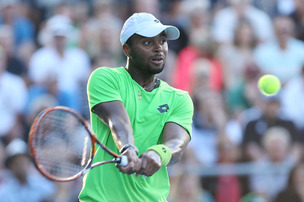 Photo credit: Getty via www.australianopen.org Photo credit: Getty via www.australianopen.org Donald Young is in the 3rd round of the Australian Open. This is no small feat folks. He’s now 24, years removed from phenom status and the according expectations heaped on him from U.S. tennis media. He’s suffered through years of intense struggles - battling himself, his parents, and the tennis establishment. His 5-set win over Andreas Seppi, the 24th seed, lands him in the 3rd round of a Slam for only the third time, and first outside of Flushing Meadows. Should he manage to scratch out a win against Kei Nishikori (16), he’ll match his best ever showing at a major. These are baby steps towards salvaging a seemingly lost career. He’ll rise from 91 to the early 70s in the rankings based on this result alone. After spending most of 2013 on the Challenger circuit, Young is now cashing in on all the hard work. U.S. media loves a comeback story; Young’s journey has positioned him for lots of positive ink should he build on this showing and turn in a solid 2014 campaign. 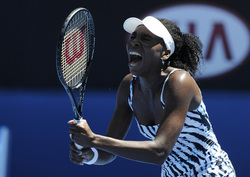 Photo credit: AP/Andrew Brownbill Photo credit: AP/Andrew Brownbill Venus Williams let a very winnable first round match slip through her grasp at the Australian Open. Up 6-2 and holding two break points for a 4-2 lead in the second, Williams unravelled and eventually lost to a more consistent Ekaterina Makarova, 6-2 4-6 4-6. This is such a disappointing result for Venus. She looked so good for the first set and a half; it seemed she was building on the good work of two weeks ago in Auckland. Even after squandering her advantage in the second set, she raced out to another lead in the third (3-0), having gotten the erratic play under control. Then, in the perfect example of why it can be so maddening to be a Venus fan, she lost 6 of the next 7 games, and the match. What went wrong?
It’s easy to sit here and write that Venus squandered countless opportunities, but that only demeans the role her opponent played in the proceedings. The fact is that Makarova acquitted herself well, playing far more consistent tennis. She’s made two consecutive quarters in Australia and beat Serena here in 2012 - she’s no slouch. More than anything, she competes well; precisely the type of player who troubles Venus most - able to take advantage of her inevitable barrage of unforced errors. If Venus is to return to the top-10, she’ll have to find a way to compete better in the middle of the court, picking the right times to attack the angles and lines. One of the biggest issues today was her impatience in changing the direction of the ball during baseline exchanges. She has the power to stay in rallies with the best, and has to trust her ability to outlast her opponent from the baseline. Venus has always been a very attacking player, but perhaps her reluctance to play more conservatively is due in part to her battle with Sjogren’s Syndrome. Maybe she doesn’t believe she can physically outlast her opponents anymore; she doesn’t trust that her body will hold up. Her most positive stat was winning 20/24 points at the net, something she must keep featuring in matches going forward. The serve wasn’t terrible today, but it let her down at key moments - most notably when she gifted three straight double faults to go down 4-5 in the second. Still, her fastest first serve was 117 mph and averaged 107 mph overall. It was enough to win, but she let herself down most from the baseline, making more than twice the number of unforced errors as her opponent. Hopefully Venus is able to put this loss behind her quickly and get on with the business of climbing the rankings. A higher ranking and being seeded will mean she won’t have to play the Makarovas of the the tour in the early rounds. This will afford her the chance to build the necessary confidence to deal with the higher ranked players later on in tournaments. The biggest key, as always, will be her health. Venus hit 50 winners today; she’s still got the fire power. It’s a matter of sustaining her play for extended periods. Quarters
(1) Serena vs. (30) Bouchard I won’t waste time telling you why Serena will win, the reasons should be obvious enough. Instead, let’s focus on Bouchard, whose success in Melbourne will signal another important step forward for the Canadian teenager. She made herself known to the tennis world last year, but making the quarters here will be unmistakable evidence that she has well and truly arrived. Winner: Serena (4) Li vs. (6) Kvitova To my mind, there are only three women who have a legitimate shot at winning it all - Li is one of them. Petra Kvitova has more talent than most, but her inability to string together consistent performances will ultimately be her undoing. The conditions won’t do her any favours either; the expected rising temperatures will make her pattern of long three set matches a herculean task as the tournament progresses into week two. Li is the rare player on tour who can hang with just about anybody. Though she’s suffered from bouts of uneven play in the past, she can also call upon prior success here to propel her forward. Last year was a bit of a revelation for Li; she managed to compile her most consistent season. I look for her to build on that in 2014. The problem for her is that she’ll likely have to go through Serena for a second major title. Winner: Li Na (8) Jankovic vs. (3) Sharapova Maria Sharapova is on the comeback trail from shoulder problems yet again. How much will a lack of matchplay factor into her performance at the Open? Maria holds an 8-1 career H2H against the former world #1, and should win under normal circumstances. However, Maria might be susceptible to the resurgent Jankovic, who seems to have recaptured some of the form that catapulted her to the top of the rankings in 2008. Jelena has played her way back into my circle of trust, and so I’ll go with the Serb to make her second Australian semi. Winner: Jelena Jankovic (5) Radwanska vs. (2) Azarenka Expect Vika to win her 8th straight against Radwanska. She’s established herself as a force down under and the second best hard court player in the game. This will be a rematch of last year’s quarters when Azarenka dropped the first set before rallying easily to win in three. Radwanska’s only shot is if the world #2 is not at her best; if both are at their best, I can’t see Vika losing. Winner: Victoria Azarenka Quarters
(1) Nadal vs. (5) del Potro Up to this point, Nadal will likely have had to beat Tomic, Monfils and Hewitt/Nishikori - a much tougher path to the quarters than he would have liked. Even though he ran through the 2013 hard court season and won the U.S. Open, I’m still not confident in Nadal’s form on the surface. He had a few indifferent losses to end the year, one being a straight set loss to the Argentine in Shanghai, and so I think he might be a bit vulnerable in this round. Couple that with del Potro’s ability to overpower Nadal and there is every chance of an upset. As much as it pains me to write this, I see del Potro moving through to the semis. Perhaps I’m overcompensating for my Nadal bias in picking against him, but so much of his game is predicated on confidence. Yes, his mental prowess is the stuff of legend, but he’s also susceptible to external factors upsetting his flow. Though he won in Dubai to start the year, he was challenged in just about every round - which leads me to believe he’s not at his most confident right now. I hope I’m wrong, but my gut says a win in Australia will be too tough an ask, especially with the draw he’s been handed. Winner: Juan Martin del Potro (4) Murray vs. (10) Tsonga Most would probably expect/hope to see Federer play Murray at this stage. I would too, but I just don’t trust Federer to string together this many quality matches. He may well beat Tsonga, or not have to play him. But, should the two meet, the Frenchman is exactly the type of player who can give Roger heaps of trouble. I’d love to see another edition of the storied Nadal-Federer rivalry, but I don’t see either of them making it that far. As for Murray vs. Tsonga, I imagine Murray will have played himself into sufficient form by the quarters to get the job done. He’s an elite player and it would be foolhardy to bet against him based solely on not being able to play his way back into fighting shape. Winner: Andy Murray (7) Berdych vs. (3) Ferrer Many have forecast gloom and doom for the world #3, claiming his best days are behind him - I’m not buying it. Ferrer has built his entire career on being the underdog and proving people wrong. Moreover, the conditions in Melbourne should suit his style of grinding out matches while his opponents wilt under the extreme heat. His fitness is his best asset and I expect the familiarity of having success here before to serve him well on his way to the semis. Winner: David Ferrer (8) Wawrinka vs. (2) Djokovic These two played epic matches at the Australian and U.S. Opens last year, with Novak taking both in 5 sets. Perhaps Stan will be able to build on a breakthrough 2013 and make that next step into the upper echelon, but it’s more likely that Djokovic will find a way to make his 15th consecutive Slam semifinal. He’s simply too good on this surface not to. In search of his 5th Australian Open crown, and on the back of a blazing indoor season to end 2013, momentum is certainly on his side. Winner: Novak Djokovic "They (young boys/men) really buy into a culture that doesn’t value what we’ve feminized" - Dr. Niobe Way.
This is very important work. Society has long perpetrated psychological warfare on young boys through privileging hyper-masculinity as the standard to which they must adhere at all costs. It’s not only a root cause of homophobia, but it also impacts girls and women throughout their entire lives. The same boys that they interact with on the playground are the same ones some will marry and start families with later on. One of the really depressing legacies of America’s obsession with brute masculinity is how it affects heterosexual men - it limits the acceptable ways in which they can interact with each other without attracting the wrong kind of attention. What’s a safe enough distance to walk beside a friend or sit beside him at the movies? How long is too long for an embrace? The list is endless. Sport plays an integral role in how this hyper-masculinity is sustained, and is often a safe haven for it to metastasize unchecked. Coaches, parents, the media etc. glorify athletes as gladiators and the epitome of what it means to be a man. The socialization of boys in sport reinforces the bad habits that we instigate from the time our children are in the womb - ascribing colour schemes based on sex, projecting our own expectation on who our children will become before they’re even born. Again, this is not just a problem for boys. Masculinity and femininity have a reflexive relationship that also affects/limits the behaviours/activities we deem acceptable for our young girls. This is such a difficult issue to address because most people don’t see it as a problem. How can we fix something that doesn’t need fixing? The truth is that we’re failing our boys by not encouraging them to express feelings, to interact with “what we’ve feminized” as a society. It’s all too much to live up to when one doesn’t fit within the prescribed way to perform one’s masculinity. This conception of how to be a man is archaic and we need to find a way to move past it. Hopefully, projects such as this will make the issue more visible and relatable to the masses. After losing 16 of their last 17 matches dating back to 2003, Lleyton Hewitt overcame Roger Federer in 3 sets to win the 2014 Brisbane International. The title is Hewitt’s first since June, 2010, when he managed that solitary win against Federer in the last decade. It also ensures his highest ranking since October, 2010 (he should rise from 60 to the early 40s).
What a fantastic way to start the year for Lleyton. He won 6-1 4-6 6-3 after having already turned back Kei Nishikori and Deliciano earlier in the week. Turning 33 next month, he doesn’t have many more years left on tour. Perhaps all the time he’s missed in recent years due to injury have allowed him a bit of borrowed time to make one last successful go of it. As for Federer, this title appeared gift wrapped and a perfect confidence boost heading into the year’s first Grand Slam. Yet, this loss is emblematic of the Federer’s returns in recent times - losing matches that would normally seem like no contests. It’s the confounding number of errors that keep doing him in - he misses shots now that he never did previously. Tommy Robredo was able to beat Federer at the U.S. Open after years of futility, and now Hewitt continues the trend of players being able to finally solve the Federer riddle. This result adds another wrinkle in the Federer plot line heading into the 2014 season. How we determine success is such a fickle business - on the one hand Roger made the final, but is his good work this week undercut by not being able to win a final in which he was so heavily favoured? Onward to the Australian Open! This week has been a perfect start to the tennis year with so many great matches and big names making great initial steps toward successful campaigns. P.S. That was a master class in giving a victory speech, mercy! 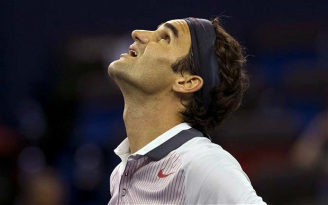 Photo credit: AP Photo credit: AP Roger Federer faces many uncertainties heading into 2014. The last year has been particularly unkind to the presumptive GOAT. His QF streak in Slams ended at his beloved Wimbledon, and he followed that 2nd round exit with a 4th round showing at Flushing. His declining results heralded a wave of headlines pondering whether he’d ever be able to recapture some of his former glory going forward. So, what can we expect from Roger in 2014? He’s hired Stefan Edberg as coach. He’s using a racquet with a larger frame. Federer’s been criticized in the past for his stubbornness in making changes to combat his steady decline. This off-season showed that he has embraced a fresh approach in an effort to get things back on track. He’s saying all the right things: forehand is good, movement is good, confidence is good. But, what if he gets off to a slow start in 2014? Do the ghosts of 2013 come back to haunt him? Federer and Nadal have given us some of the most memorable and epic tennis matches of all time. The rivalry holds a very prominent place in our collective memories as one of the all-time greats. Yet, the overall win-loss record is now incredibly one-sided. In fact, Federer’s a couple losses against Djokovic away from having a losing record against all other members of the so-called “Big 4” - a seemingly irreversible trend at this point.
Nadal leads Federer 22-10 Federer leads Djokovic 16-15 Murray leads Federer 11-9 There’s also the not-so-small matter of how secure Roger’s place is among the Big 4. No one will ever be able to take away all that he’s accomplished, but until he’s able to show once more that he can stand toe-to-toe with Nadal, Djokovic and Murray, then talk of his membership as part of the Big 4 is merely ceremonial. In previous seasons, some of the most enthralling stories have featured players returning to the tour after prolonged absences. Some came out of retirement, while others had overcome injuries/illnesses, or started a family etc. What does 2014 offer us by way of the comeback?
The most prominent player on either side who fits the bill is Vera Zvonareva. The former world #2 hadn’t played on the WTA Tour since the London Olympics before she entered the Shenzhen Open this week. The Russian is no slouch - a two-time Slam finalist and Olympic bronze medallist. But, she faces a tough road back with likely early round opponents being top seeds (Li Na this week). Still, her 5-7 3-6 loss bodes well going forward. Kim Clijsters spoiled tennis fans with her ability to immediately compete for Slam titles after lengthy absences. She is a unique talent who possesses a killer skill set. Vera, while a very good player before her injury, has nowhere near the talent of a Kim Clijsters. Patience and perseverance will be her best ally in 2014. Ross Hutchins will be making a return to the ATP doubles circuit after a battle with Hodgkin’s lymphoma. The Brit missed all of 2013 after his diagnosis. His is an improbable and triumphant return. I wish him all the luck and success in 2014 and beyond. The other big name floating around regarding a return from illness is Robin Soderling. The Rafa slayer has been M.I.A. since 2011 while recovering from mononucleosis. There’s still no word on when, or if, Soderling will be able to return to the ATP Tour. However, I found that he is producing his own line of tennis balls under the brand RS-Tennis. You can check that out here. Come back soon Robin! |
ARCHIVES
September 2022
|
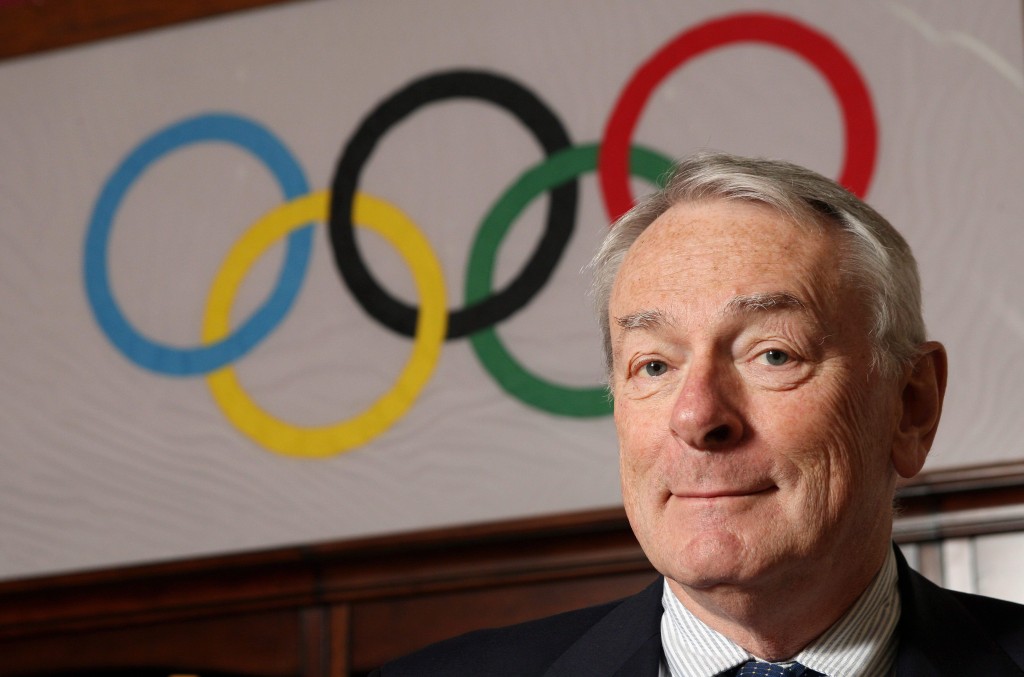
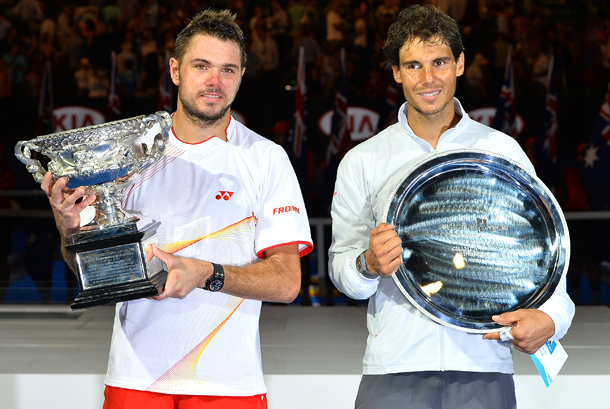
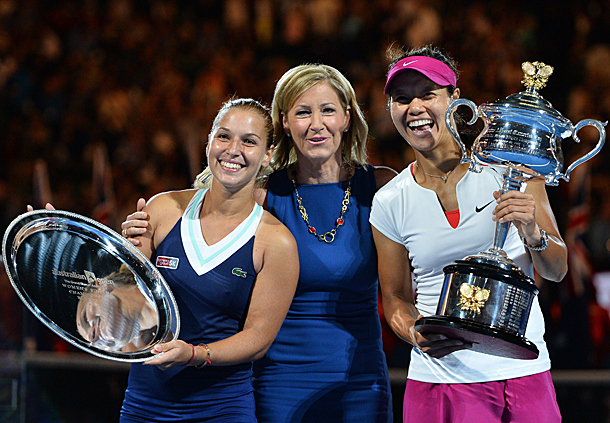
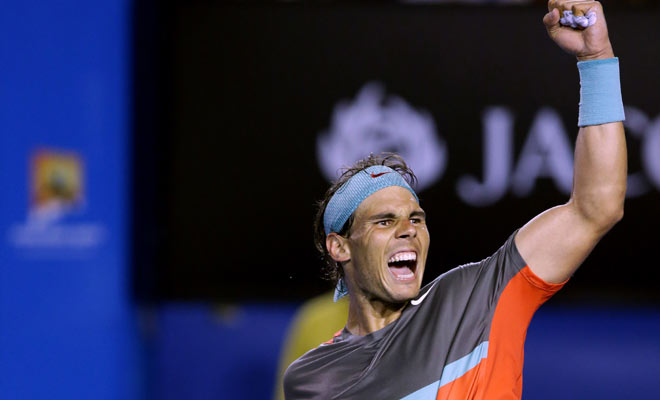



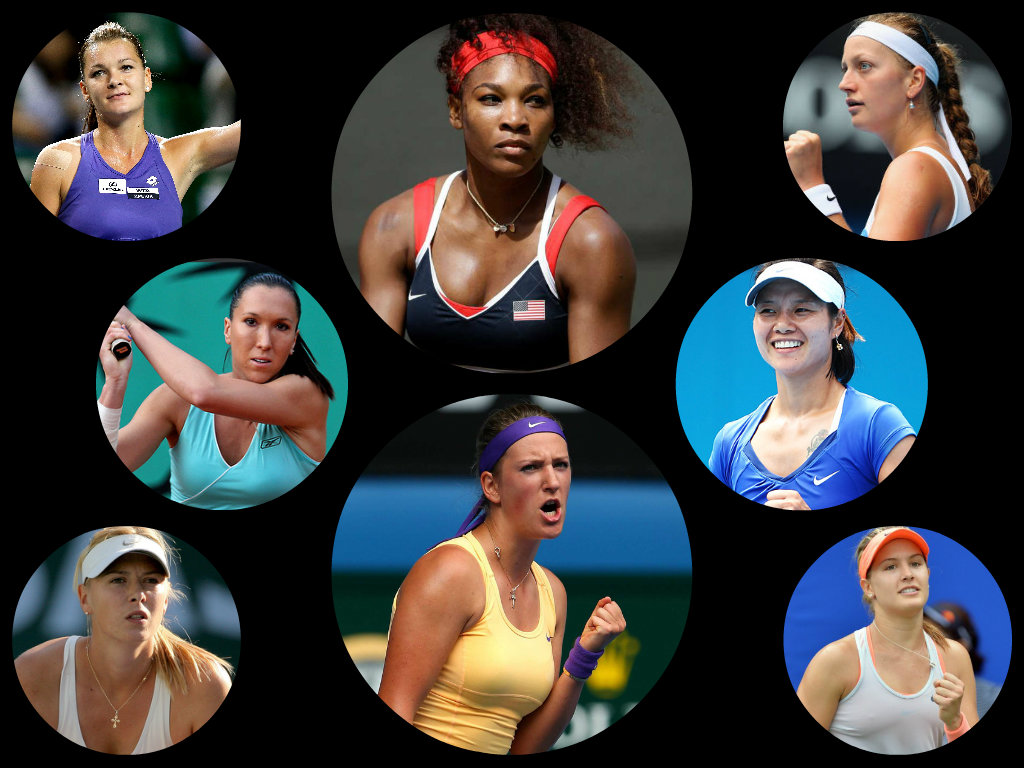
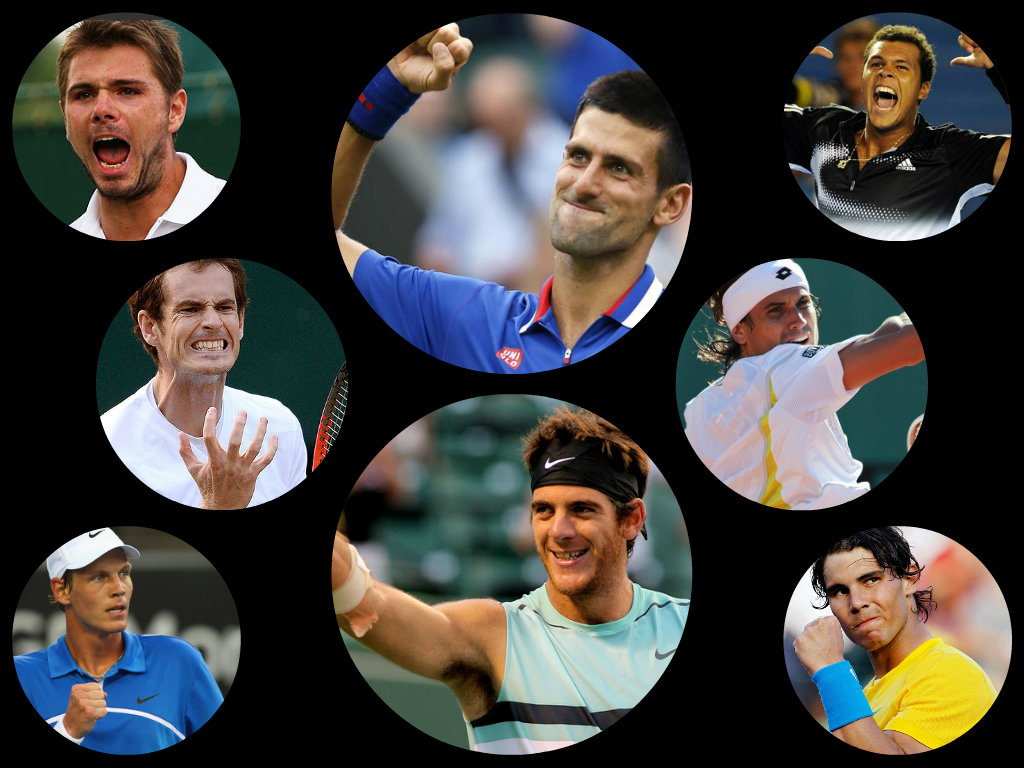
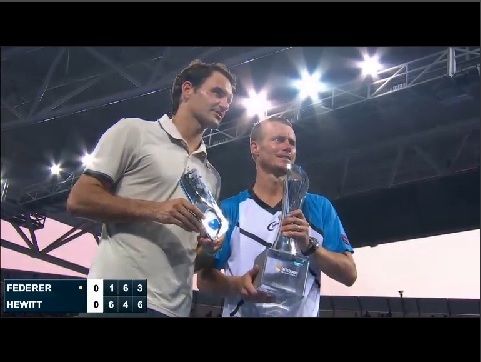
 RSS Feed
RSS Feed